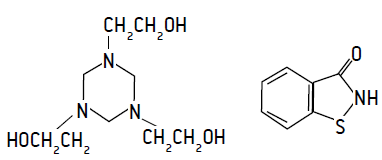Knowde Enhanced TDS
Identification & Functionality
- Carrier
- Chemical Name
- CASE Ingredients Functions
- Industrial Additives Functions
- CAS No.
- 2634-33-5
- EC No.
- 220-120-9
- Product Families
- Chemical Structure

- Composition
An aqueous solution of 1,2-benzisothiazolin-3-one and hexahydro-1,3,5-tris(2 hydroxyethyl)-s-triazine
Features & Benefits
- CASE Ingredients Features
Applications & Uses
- Markets
- Applications
- Applicable Processes
- Adhesive & Sealant Type
- Coating Type
- Use Level
- 0.01-0.30%
- Applications
The product is effective in a wide range of industrial aqueous-based products. The combination of two active agents provides a quick microbial kill with long term protection. In addition, the “triazine” active agent gives enhanced head space protection in the container. Application areas include:
- Synthetic polymer emulsions
- Emulsion paints
- Aqueous pigment dispersions
- Water-based adhesives
- Amount to Use
Table 3. Applications
Product % PROXEL™ TN Preservative (w/w) Emulsion Paints 0.05-0.2 Pigment dispersions: based on slurries 0.05-0.2 Synthetic polymer emulsions 0.05-0.2 Water-based adhesives 0.05-0.15 PROXEL™ TN Preservative should be added to the system as early in the process as possible but only after all heating stages are completed and the temperature of the product is less than 40°C. The concentration required to adequately preserve your product depends on several factors. These include the susceptibility of the system to microbiological degradation, the extent to which micro-organisms can gain access, the species involved, pH, temperature, and length of time for which protection is required.
A range of concentrations and applications is recommended in Table 3; however, it is recommended that a testing program be undertaken to determine the most costeffective dose for your application.
Testing should take into account chemical compatibility/stability, plant hygiene conditions, susceptibility of the product to contamination, and the typical organisms involved.
Properties
- Soluble in
- Water
- Typical Physical Properties
- Minimum Inhibitory Concentrations (MIC)
Table 1.
Micro-organism PROXEL™ TN Preservative (ppm) Bacteria Bacillus subtilis 100 Enterobacter cloacae 150 Escherichia coli 100 Proteus vulgaris 175 Pseudomonas aeruginosa 200 Pseudomonas putida 200 Staphylococcus aureus 100 Strephylococcus faecalis 100 Strephylococcus lactis 100 Fungi Alternaria alternata 1000 Aspergillus niger 500 Aureobasidium pullulans 750 Chaetomium globosum 500 Cladosporium cladosporioides 600 Penicillium notatum 300 Yeasts Candida albicans 150 Rhodotorula rubra 200 Saccharomyces cerevisiae (turbindans) 150 - Antimicrobial Properties
The levels of product needed to prevent the growth of problem microorganisms are listed in Table 1; Minimum Inhibitory Concentrations (MICs) do not represent effective use levels but do indicate the broad spectrum of activity.
PROXEL™ TN Preservative has a non-specific mode of action which means that bacterial resistance is very unlikely to occur. Detailed information on the mode of action is available on request.- Active Agent
50% w/w “triazine” and 5.5% w/w 1,2-benzisothiazolin-3-one
- Compatibility
Compatible and effective over pH range 4-12. Stable in the presence of amines.
Incompatible with some oxidizing and reducing agents e.g. persalts, sulphites etc.
| Value | Units | Test Method / Conditions | |
| pH Value (25°C) | 12 | — | — |
| Viscosity (at 10/25°C) | 180/60 | mPas | Newtonian |
| Boiling Point | 110 | °C | — |
| Flash Point | Boils without flashing | °C | — |
| Density (at 25°C) | 1.13 | — | — |
Regulatory & Compliance
- Certifications & Compliance
- Chemical Inventories
- Total Quality
Lonza Microbial Control holds a number of ISO 9001 Quality Management registrations covering our product range. The scope of each registration is specific to the location or entity named on the Registration Certificate and our products are supplied to ISO 9001 Standards.
- Regulatory Information
The components of PROXEL™ TN Preservative are in compliance with the following inventories:
- EINECS (Europe)
- TSCA (USA)
- AICS (Australia)
- ENCS (Japan)
- DSL (Canada)
- KECL (Korea)
- PICCS (Philippines)
- IECSC (China)
Safety & Health
- Risk Assessment and Management
Lonza professionals have a wide expertise in the fields of Safety, Health and the Environment. Lonza Microbial Control is committed to and uses this expertise in understanding the suitability of PROXEL TN Preservative for specific applications
Packaging & Availability
- Regional Availability
Storage & Handling
- Storage & Stability
Stable under normal conditions of storage down to -10°C. If frozen, allow to thaw and stir well before use.

